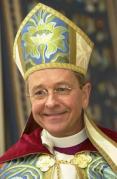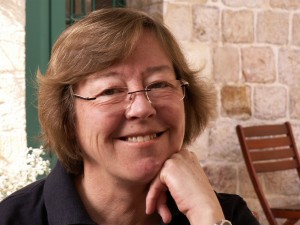Executive Council members call for special meeting on Uganda legislation
By Mary Frances Schjonberg,
[Episcopal News Service] A teleconference meeting of the Episcopal Church's Executive Council will take place on Dec. 7 to discuss a possible statement on Ugandan legislation that would imprison for life or execute people who violate that country's anti-homosexuality laws.
Sixteen members of the council requested the meeting with a handwritten petition that said a motion would be offered at the meeting "regarding the urgent human rights situation in Uganda."
Homosexuality in the African nation currently carries a penalty of up to 14 years imprisonment. If passed, the proposed bill would extend prison sentences for homosexuals up to and including life imprisonment and introduce the death penalty for "aggravated homosexuality," which includes assault against people under the age of 18 and those with disabilities. It also would give Ugandan courts jurisdiction over Ugandan citizens who violate the law "partly outside or partly in Uganda."
The Executive Council, an elected group of clergy, laity and bishops that carries out the programs and policies adopted by the General Convention, according to Canon I.4 (1)(a), normally meets three to four times a year. The next meeting is set for Feb. 19-22.
However, the Presiding Bishop as president of the council may call a special meeting and a minimum of nine council members may petition in writing for such a meeting under Canon I.4 (4)(a).
The last special meeting occurred April 13, 2005 when then-Presiding Bishop Frank Griswold called a one-day meeting in Mundelein, Illinois near Chicago to formulate a response to a request of the Anglican Communion's primates that the Episcopal Church voluntarily withdraw from the Anglican Consultative Council until the next meeting of the 2008 Lambeth Conference. The minutes of that meeting are here and the response is here.
The 16 members circulated the petition amongst themselves at a Nov. 17-20 gathering in Chicago of the Episcopal Church's so-called interim bodies, the Committees, Commissions, Agencies and Boards (commonly know as CCABs). The members were at the meeting in their roles as council liaisons to the church's standing commissions. All council members who were approached to sign the petition, agreed to do so, according to Sarah Dylan Breuer, council member from Massachusetts and one of the signers.
The council members' request came on the same day that the Chicago Consultation, a group of lay and ordained Episcopalians, called on Presiding Bishop Katharine Jefferts Schori, House of Deputies President Bonnie Anderson, Archbishop of Canterbury Rowan Williams, and Archbishop Henri Orombi of Uganda to speak out against the legislation. None of them has issued any statements thus far.
Also that day, during at the CCABs meeting in Chicago, the Standing Commission on Anglican and International Peace with Justice Concerns agreed to a statement saying that the members discussed the Ugandan legislation at length, were "deeply alarmed" by it and urged the Executive Council to address the issue before its February meeting.
The commission offered "proposed language" for the council to consider as a resolution. In it the council would join with the Anglican Church of Canada in expressing "dismay and concern" over the proposed legislation, call upon the U.S. government to convey via the Secretary of State "a sense of alarm about this fundamental violation of human rights" and ask the Archbishop of Canterbury, other church leaders, and other appropriate leaders and bodies of the Anglican Communion to take similar action.
The Anglican Church of Canada's Council of General Synod on Nov. 15 expressed its dismay and concern about the draft legislation, saying that the proposed bill "would severely impede the human rights of Ugandan citizens both at home and abroad [and] impose excessive and cruel penalties on persons who experience same-sex attraction as well as those who counsel, support, and advise them, including family members and clergy."
Alexander Baumgarten, director of the Episcopal Church's Office of Government Relations, recently told ENS that "the Episcopal Church, like the Anglican Communion as a whole, is very clear in its support for the human rights of all people, including gay and lesbian persons."
"For us in the Episcopal Church, that means we oppose all abuses of human rights, whether in our own midst or in other parts of the world, and we seek to make that opposition known through our ministry of advocacy," he said.
Baumgarten noted that for the past several weeks, the Episcopal Church "has encouraged Episcopalians who have contacted us on this issue to be in touch with their own elected officials. As of the present moment, we are very encouraged by the engagement of the U.S. State Department, which has called the law a 'significant step backwards for human rights,' and has given public assurances that it is addressing the matter with the Ugandan government. It is our understanding that neither the Ugandan government nor the Church of the Province of Uganda (Anglican) has taken a position on this legislation."
The Anglican Church of Uganda on Nov. 6 issued a press release saying that it is studying the bill and does not yet have an official position on the proposed legislation. However, the release restated the Ugandan church's position that "homosexual behavior is immoral and should not be promoted, supported, or condoned in any way as an 'alternative lifestyle.'"
And AllAfrica.com reported Oct. 29 that the church's provincial secretary told the Monitor newspaper in Kampala, Uganda that jailing homosexuals was preferable to executing them. "If you kill the people, to whom will the message go? We need to have imprisonment for life if the person is still alive," said the Rev. Canon Aaron Mwesigye, according to the website.
The 16 members who signed the petition are the Rev. Canon Tim Anderson, Hisako Beasely, Sarah Dylan Breuer, Jane Cosby, Martha Gardner, the Rev. Floyd "Butch" Gamarra, Bruce Garner, Anita George, the Ven. Joyce Hardy, Stephen Hutchinson, the Rev. Cristobal Leon, Katie Sherrod, the Rev. Terry Starr, Deborah Stokes, Anne Watkins, the Rev. Sandye Wilson.
Breuer told ENS Nov. 23 that the teleconferencing method meant that the council could meet quickly at less cost and provide "an opportunity for all of us to stand with our presiding officers (Jefferts Schori and Anderson) behind whatever conclusion the meeting comes to."
"I think the ability of Executive Council to respond to such a time-sensitive request in accordance with our polity and without burdening the budget is one example of what our Presiding Bishop has been saying: Perhaps a shrinking budget helped the process along, but embracing technology to meet over distances presents us with exciting opportunities too," she said.
The money available for the CCABs (of which the council is one) to meet face-to-face was reduced when the 2010-2012 budget was cut by $23 million from the current plan. It is anticipated that the most of the groups would primarily meet online or with telephone conferencing.
Breuer said that the conference-call meeting is "an opportunity to discuss an issue that the entire church is passionate about [and] to let people know that our response has been considered by clergy, laity and bishops, and has been considered carefully and prayerfully," Breuer said. She added that she hoped such a consideration will show "there's broad consensus" about whatever stance the council takes.
-- The Rev. Mary Frances Schjonberg is national correspondent for the Episcopal News Service.










